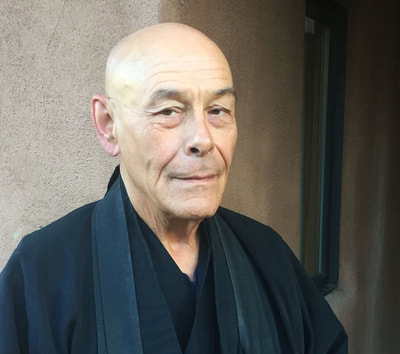Seiju Mammoser is the abbot of the Albuquerque Zen Center, as he was when I visited it in 2013. “My interest in starting the center here in the city was basically working man’s Zen. You had a job. You had a family. You had responsibilities. You wanted to do practice. I wanted something you could do every morning. I wanted something you could do in the evening. So, you could work around your responsibilities and your life, and you could do practice.”
Seiju denies being a teacher. “I wouldn’t teach you how to sit. I would sit. I would say a few things, and what you understood hopefully you’d do. You know, it’s like, am I gonna teach you how to breathe?”
Seiju’s involvement with Zen began in the early ’70s when he came upon a book left on a coffee table. “An eminently forgettable book. But it made me realize that I was hungry for something, and it got me started.”
He visited the San Francisco Zen Center briefly. “Stayed for a chanting service in the afternoon and left immediately. Made my way to LA. Stopped at a place called Cimarron Zen Center at the time. It’s called Rinzai-ji now. It was interesting. But it was in Los Angeles, and I grew up in Chicago. I didn’t need another big city. They said they had this place up in the mountains. Mount Baldy. So I went there for a week. Liked it.”
Rinzai-ji and Mount Baldy were established by the controversial Japanese teacher, Joshu Sasaki, who at the time of my visit to Albuquerque – when he was 106 years old – had been revealed to have been making unwanted sexual advances to many of his female students for decades. Regardless, many of Sasaki’s students – including Seiju (and Leonard Cohen) – remained loyal to him.
“You meet somebody who inspires you. Motivates you and moves you and demonstrates—in front of you, in his manifestation—exactly what he’s talking about. He was the first living teacher I’d met. He was sufficient. I didn’t have to go see somebody else. I knew what I was dealing with.”
Seiju doesn’t deny that Sasaki interfered with some of his female students, but he cautions that the tendency of people “to get to a mind of judgement impedes understanding. Once I make a decision—‘That’s right; that’s wrong; this or that’—then I line up behind my judgement and act. I haven’t found a mind of judgement to be particularly helpful for a mind of practice.
“In the human scope of things, everything becomes a thing. Things are entities. So Sasaki Roshi is a person. That’s a dog,” pointing the dog, Jemez, who has been accompanying all morning. “That kind of thinking. Very common. Very understandable. Very human. That’s not what Buddhism teaches us. Everything is activity. Sometimes I manifest skillful activities. Sometimes I manifest foolish activity. And sometimes I manifest selfish activity. I can be a loving parent, and I can be a terrible co-worker. And I can be both of those and all of those in the same day. And anything else. And in my experience around Sasaki Roshi, he’s been a remarkable, deeply committed teacher.

“People presume that if you’re quote ‘enlightened’ end quote—whatever that means—or ‘awake’ or anything else, you can’t possibly do this other stuff. I don’t know the answer to that. But it’s pretty obvious to me that the one person I’ve spent time with who seems to come closest to what a lot of people would think of as an ‘awake’ person has also done these other things. And that, to me, is just skillful activity and unskillful activity. Which, again, we all do in our lives.”
Seiju is not insensitive about these matters, and in 2018 the Albuquerque Center issued an Ethics policy which explicitly states:
We are clear that any sexual relationship between a teacher, or any other person in a position of power, and his or her student is inappropriate and unacceptable.
We are committed to identifying and understanding sexual misconduct and to empower our Sangha members and teachers to respond compassionately and appropriately should an issue of this nature be brought to their attention.
We also recognize the great harm created by gossip, innuendo, rumors, retaliation, intimidation, mistreatment of others, and other forms of unethical behavior generated by anyone and directed towards any member. We recognize that a breach of ethics is at the root of misconduct and that everyone is accountable for his or her behavior.
All AZC teachers and members are fully aware of the ethical standards expected of them and have wholeheartedly and without reservation agreed to live by these standards.
It was, in some ways, an awkward interview. Given the media attention being paid at the time to the issue of Sasaki’s behavior, Seiju had cause to be wary of me. I, on the other hand, came away with a sense of admiration, in particular, for his uncompromising attitude about the nature of Zen practice.
As we are touring the facility, he calls my attention to a sheet of paper on a bulletin board by the door. It’s a quotation from a talk Sasaki gave at Bodhi Manda in 1982:
The standpoint of this Zen Center is our own practice of Dharma Activity. Therefore we accept those who want to study Dharma Activity. Those who are not interested in Dharma Activity should leave immediately.
Seiju states it bluntly: “Teaching is doing. Words are words, but teaching is doing.” It all comes back to sitting down, being still, and breathing. If you’re not up to that, “have a nice drive home.”
Joshu Sasaki died nine months after my visit to the Albuquerque Center on July 27, 2014.
Cypress Trees in the Garden: 45-55, 56-57, 66, 99, 121
The Story of Zen: 288-90, 325, 329
Other Links:
https://rickmdaniel.blogspot.com/2013/10/106-seiju-mammoser.html

One thought on “Seiju Bob Mammoser”